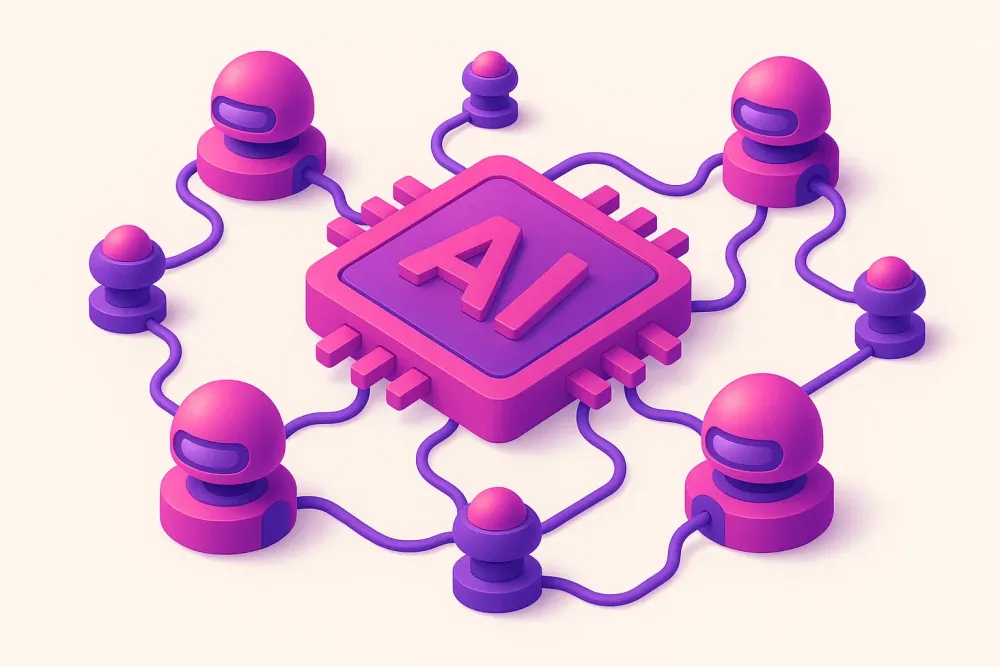Home
Services
Products
Projects
Who We Are
Blogs
Contact Us

Unleashing the Power of AI Agent Swarms: The Future of Intelligent Automation
Microsoft CEO Satya Nadella recently declared that "humans and AI agent swarms will be the next frontier" in artificial intelligence. He envisions teams of humans collaborating seamlessly with groups of AI agents to achieve complex tasks across diverse platforms. This statement signals the arrival of AI swarm intelligence, a revolutionary advancement in intelligent automation. Swarms of AI agents represent a paradigm shift, functioning as digital coworkers that share insights and collaborate autonomously to execute tasks with minimal human oversight.
This article explores the core concepts of AI agent swarms, delving into their architecture, operational models, and best practices for business implementation. We'll uncover how these swarms are transforming industries and driving unprecedented efficiency.
An AI agent swarm is a collective of specialized AI agents, each responsible for a specific task. These agents interact and collaborate within the group to achieve a shared objective. This collaborative approach allows AI agents to tackle complex tasks with greater accuracy and speed than a single agent working in isolation.
Imagine a restaurant kitchen: each chef has a defined role, yet they work together seamlessly to deliver a cohesive dining experience. One chef preps ingredients, another grills, another manages salads and soups, while the head chef orchestrates the entire operation. AI agent swarms operate similarly, with individual agents contributing their expertise to the collective goal.
This concept draws inspiration from natural swarms, such as bees or ants. Each individual has specific duties, contributing to the overall success of the colony. Why are AI agent swarms more effective than single AI agents? The answer lies in the power of collective intelligence and the division of labor. A single AI agent attempting to manage everything from data processing to forecasting, customer interactions, report generation, and knowledge management is susceptible to errors. This divided attention impacts efficiency and accuracy.
AI agent swarms, however, distribute tasks among specialized agents, each dedicated to a specific function and collaborating with others. This focused approach enhances efficiency and accuracy in achieving the overarching goal. As the saying goes, "The strength of a hive lies not in a single bee, but in the collective power of the swarm, where unity is the true source of their strength."
Agent swarms excel in adaptability, fault tolerance, and collaborative problem-solving, making them invaluable in today's dynamic technological landscape:
- Dynamic Adaptability: Agent swarms adapt to changing conditions and new information in real time, making them ideal for rapidly evolving environments.
- Fault Tolerance: The distributed nature of swarms ensures resilience. If one agent fails, the others continue functioning, maintaining overall system reliability.
- Collaborative Problem-Solving: Agents share information and resources, enabling more efficient solutions to complex problems than a single agent or rigid system.
- Collective Intelligence: The interaction of agents creates emergent behavior, where simple individual actions contribute to complex group dynamics. This mirrors how natural swarms efficiently solve problems like finding food or navigating obstacles.
Today's business world is characterized by dynamic market conditions, evolving customer demands, and continuous technological advancements. Businesses need intelligent systems that can rapidly process information, adapt, and respond to new challenges. Agent swarms offer this flexibility and resilience, becoming a critical component of intelligent automation for competitive businesses.
Types & Architectures Of AI Agent Swarms
A one-size-fits-all approach doesn't work for AI agent swarms. Different business applications, from marketing and customer service to sales, finance, administration, supply chain, and HR, have unique workflows and operational requirements. A generic swarm cannot effectively handle diverse use cases. Specialized swarms with agents trained for specific domains are essential. Hence, various types and architectures of AI agent swarms exist.
Real-World Applications Of AI Agent Swarms
Here are some notable applications of AI agent swarms in business operations:
Software Development:
Collaborative Coding: AI agent swarms can autonomously generate, test, and refine software ideas based on market trends and user feedback, leading to faster project completion and improved quality.
Rapid Prototyping: Swarms can gather and analyze user feedback on prototypes, facilitating quick iterations and alignment with user expectations.
Marketing:
Campaign Management: Agent swarms can autonomously manage online marketing campaigns, optimizing strategies and targeting specific audience segments in real time.
Personalized Recommendations: By analyzing customer behavior and preferences, swarms can tailor product recommendations, enhancing customer experience.
Supply Chain Management:
Inventory Optimization: Swarms coordinate tasks like inventory management and logistics in real time, optimizing the entire supply chain.
Demand Forecasting: By analyzing historical data and current trends, swarms accurately predict future demand, enabling proactive operational adjustments.
Financial Services:
Algorithmic Trading: Swarms enhance trading strategies by analyzing market data, news, and trends simultaneously, reducing human error and improving efficiency.
Risk Assessment: Swarms evaluate various risks (credit, market, operational) to create comprehensive risk profiles for informed decision-making.
Customer Service:
Automated Support: Swarms handle customer inquiries, manage returns, and even proactively predict potential issues, enhancing customer satisfaction.
Feedback Analysis: Swarms continuously learn from customer interactions, improving service quality over time.
How DEFX Can Help You Implement Swarm Intelligence
AI swarm intelligence represents the next frontier in business technology. This innovative concept moves beyond traditional automation, introducing a more advanced autonomous approach powered by multiple agents deployed in swarms to address complex challenges beyond the capabilities of individual agents.
Business leaders should embrace swarm technology and develop a strategic implementation blueprint. Swarm intelligence isn't a peripheral technology; it's a foundational element for future growth.
DEFX, a leading IT services provider, specializes in developing and deploying AI agent swarms tailored to your business processes. We empower your teams to boost productivity and accuracy while reducing operational costs.
Contact Defx today to explore how we can help you harness the power of AI agent swarms.
See More
Contact Us
Let’s make your Idea into Reality
Let's Talk
© Copyright DEFX. All Rights Reserved
GoodFirms ★ 4.2
Clutch ★ 4.2
Google ★ 4.2
